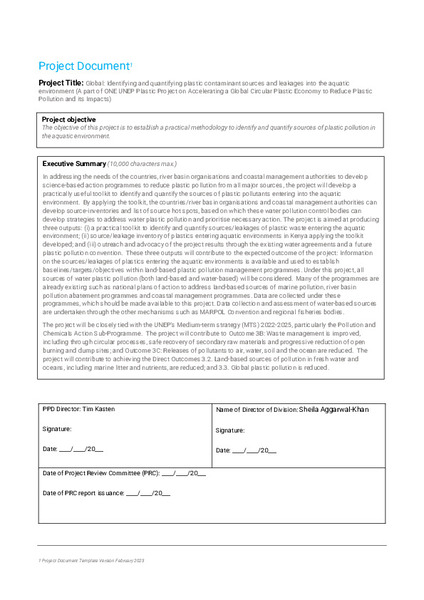| dc.contributor | Industry and Economy Division | en_US |
| dc.contributor.author | United Nations Environment Programme | en_US |
| dc.date.accessioned | 2024-08-30T05:42:29Z | |
| dc.date.available | 2024-08-30T05:42:29Z | |
| dc.date.issued | 2024-08 | |
| dc.identifier.uri | https://wedocs.unep.org/20.500.11822/46127 | |
| dc.description | In addressing the needs of the countries, river basin organisations and coastal management authorities to develop science-based action programmes to reduce plastic pollution from all major sources, the project will develop a practically useful toolkit to identify and quantify the sources of plastic pollutants entering into the aquatic environment. By applying the toolkit, the countries/river basin organisations and coastal management authorities can develop source-inventories and list of source hot spots, based on which these water pollution control bodies can develop strategies to address water plastic pollution and prioritise necessary action. The project is aimed at producing three outputs: (i) a practical toolkit to identify and quantify sources/leakages of plastic waste entering the aquatic environment; (ii) source/leakage inventory of plastics entering aquatic environments in Kenya applying the toolkit developed; and (iii) outreach and advocacy of the project results through the existing water agreements and a future plastic pollution convention. These three outputs will contribute to the expected outcome of the project: Information on the sources/leakages of plastics entering the aquatic environments is available and used to establish baselines/targets/objectives within land-based plastic pollution management programmes. Under this project, all sources of water plastic pollution (both land-based and water-based) will be considered. Many of the programmes are already existing such as national plans of action to address land-based sources of marine pollution, river basin pollution abatement programmes and coastal management programmes. Data are collected under these programmes, which should be made available to this project. Data collection and assessment of water-based sources are undertaken through the other mechanisms such as MARPOL Convention and regional fisheries bodies. | en_US |
| dc.format | pdf | en_US |
| dc.language | English | en_US |
| dc.rights | Public | en_US |
| dc.subject | aquatic environment | en_US |
| dc.subject | plastic waste | en_US |
| dc.subject | leakage | en_US |
| dc.subject | circular economy | en_US |
| dc.subject | pollution | en_US |
| dc.title | Project Title: Global: Identifying and Quantifying Plastic Contaminant Sources and Leakages into the Aquatic Environment (A part of ONE UNEP Plastic Project on Accelerating a Global Circular Plastic Economy to Reduce Plastic Pollution and its Impacts) | en_US |
| dc.type | Factsheets, Infographics and Brochures | en_US |
| wd.identifier.sdg | SDG 8 - Decent Work and Economic Growth | en_US |
| wd.identifier.sdg | SDG 14 - Life below Water | en_US |
| wd.identifier.sdg | SDG 15 - Life on Land | en_US |
| wd.topics | Chemicals and Pollution Action | en_US |
| wd.topics | Finance and Economic Transformations | en_US |
| wd.identifier.pagesnumber | 62 p. | en_US |




